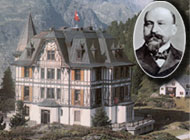The villa on the glacier

With its turrets and ornate façade, the Villa Cassel is not the sort of building one would expect to find perched on a mountain ridge above the biggest glacier in Europe.
It appears curiously out of place on the Riederfurka ridge, more than 2,000 metres above sea level.
Built in 1902 for the wealthy British banker, Sir Ernest Cassel, it now houses an information centre of a leading Swiss environmental group.
On doctor’s orders, Cassel travelled to Switzerland and the Aletsch region for the healthy mountain air. He found the views of mountain peaks and the Aletsch Glacier so impressive that he returned to the site year after year.
But he found the modest hotel there less impressive than the views, so he decided to build a more acceptable residence.
He proceeded to set up a charity and financed the construction of a school to persuade the communities to sell him the land.
Carrying chandeliers, pianos
During the two-year construction period, many local men supplemented their meagre incomes by working as builders and porters, hauling everything from chandeliers and leather armchairs to pianos up the mountainside.
Cassel and his family and guests – who included the biggest names among European nobility and politics – made the four-hour journey from the valley on mule or horseback.
The banker entertained them with rounds of bridge, excursions into the Aletsch forest, and fancy balls and dances. Political discussions were said to be frequent and heated.
King Edward VII was one of Cassel’s bridge opponents, his name written simply as “The King” on a scorecard preserved at the villa.
Bells bothered Churchill
Winston Churchill took part in the games during his stays, went on walks across the glacier and climbed some of the mountains. He also found time to make himself unpopular with the local cowherds after demanding that they remove the cowbells from their cattle. The ringing, he said, disturbed his writing.
Cassel intervened, asking the peasants to stuff straw in the bells to dampen the noise. But it gave the locals more proof, in their opinion, that the tourists were “fools”. Who in their right mind, they argued, would spend so much time on a mountain doing nothing.
The villa remained in the hands of the banker until his death in 1921. A few years later, his granddaughter and heir – who was to become Lady Mountbatten because of her marriage to Louis Mountbatten – sold the residence.
The villa became a jewel in the crown of the new owners, the Cathrein family, who already controlled most of the hotels in the Aletsch region. For the next 40-odd years the Hotel Villa Cassel received paying guests, who enjoyed the same views and fresh mountain air that had so impressed the British banker.
Chalets gained favour
But paradoxically, as tourism swelled in the 1960s, the glory days of many of Switzerland’s grand hotels came to an end. The new tourists in the Aletsch region preferred holiday chalets and apartments to rooms in a faded villa.
The Hotel Villa Cassel closed its doors in 1969, only to be saved a few years later by the environmental organisation, Pro Natura.
Using visitor centres found in many national parks in the United States as their model, the Pro Natura officials renovated and reopened the building as the “Aletsch Centre”.
Guest rooms like the one Churchill stayed in have also been restored, and are rented to visitors, mainly those who arrive for nature study tours.
Exhibitions using interactive displays help visitors understand the biodiversity of the Aletsch Forest and Glacier.
The villa’s main dining room is dedicated to its history and is furnished with some original pieces, including the piano, that were carried up the mountain on peasants’ backs nearly 100 years earlier.

In compliance with the JTI standards
More: SWI swissinfo.ch certified by the Journalism Trust Initiative
You can find an overview of ongoing debates with our journalists here. Please join us!
If you want to start a conversation about a topic raised in this article or want to report factual errors, email us at english@swissinfo.ch.